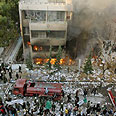
Syria behind torching of Danish buildings?
Lebanese leader accuses Damascus of using undercover soldiers in cartoon-protest attacks
"Syria is stirring trouble in the region. Regarding the burnings and protests in Damascus, it is very bizarre that a so-called secular totalitarian regime that controls everything was not able to control these demonstrations," said Jumblatt, Druze leader and head of Lebanon's Progressive Socialist Party.
"The violence and burnings in Lebanon were the work of Syrian soldiers and workers dressed in civilian clothes."
On Sunday, thousands of Muslim demonstrators in Beirut clashed with police, storming the city's Danish consulate and setting it ablaze in protest over cartoons in Danish and other European newspapers that mocked Muhammad. A nearby Maronite Catholic church was also attacked, prompting fears the protests could turn into a sectarian clash.
In Damascus on Saturday the evacuated Danish and Norwegian embassies were burned during protests that also damaged the Swedish embassy. Rioters reportedly tried to storm the city's French mission but were held off by police.
'Remember Assad's warnings'
Jumblatt accused Syria of using plain-clothes soldiers to torch Beirut's Danish consulate.
"Those involved, including some arrested, were found to be people working for Syria, including Syrian soldiers disguised as civilians," said Jumblatt.
"They were sent from remote areas in the south, a kind of orchestration. Even though clerics of al-Jamal Islaimya (an extremist Lebanese splinter faction) denounced violent protest, they couldn't control the Syrian saboteurs," he added.
Jumblatt contended Assad used the protests to stir regional violence alongside the continuing probe into the assassination last February of former Lebanese Prime Minister Rafiq Hariri for which Damascus has been widely blamed. The United States and some European countries are calling for United Nations sanctions against Syria.
"Remember Assad's warnings to the international community that if he is put under pressure, chaos will prevail in the region," said Jumblatt.
"Also, I think Assad doesn't want to be isolated in the Muslim world, so he is pretending to be on the side of the Muslim cause by rioting against the cartoons."
Syrian, Lebanese protestors most violent
The cartoon controversy erupted a week ago following a request by Denmark's Jyllands-Posten for cartoonists to create satirical drawings of Muhammad. Muslims are prohibited from creating images of Muhammad. Some Muslims consider caricatures to be particularly blasphemous.
The Muhammad cartoons have been reprinted in Bulgaria, France, Germany, Italy, Ireland, Jordan, Spain, Switzerland, Hungary, New Zealand, Norway and Poland.
Muslims protested throughout the Middle East. Protesters in Turkey marched outside the Danish consulate. Terror groups in the West Bank threatened Danish and European interests. The Al-Aqsa Martyrs' Brigades, an offshoot of Palestinian Authority President Mahmoud Abbas' Fatah Party, briefly kidnapped a German in the Balata refugee camp on Thursday but released him hours later.
The Syrian and Lebanese protests were the most violent so far.
"Assad is playing with fire (with these burnings and riots). It can turn into massive violence around the Middle East. This is beyond irresponsible. These are reckless acts by a terrorist regime," Jumblatt said.
Reprinted by permission of WorldNetDaily










